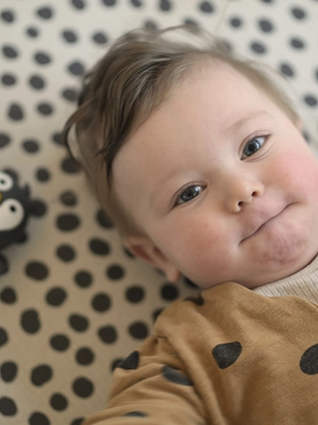
- Home
- Advice Hub
- Baby
- Bonding & Development
- When Do Babies Start Teething?
When do babies start teething?
From just a few months old, teething is blamed for everything from nappy rash to dribbling to crying and the symptoms appear to go on and on and on. But how much of it is actually teething, and how long does it really last? Let’s dig in.
Flushed cheeks? Probably teething. Sore skin? It’ll be the teeth. Miserable for no reason? Got to be those toothy pegs! From just a few months old, teething is blamed for everything from nappy rash to dribbling to crying for no (obvious) reason – and the symptoms appear to go on and on and on. But how much of it is actually teething, and how long does it really last? Let’s dig in.
When does teething start?
First, there’s no set timeline for teething. Some babies are born with teeth, some babies don’t get their first teeth until after their first birthday! It will usually start between 3 and 12 months old, and your little one should have all their teeth by the time they’re three. Some of those teeth will appear with relatively little discomfort, but teething can be very uncomfortable for your baby and it’s good to recognise the usual symptoms and have some tricks up your sleeve to help ease them.
Teething Symptoms
Teething can be a tricky time for your baby (and for you!). Here are some common signs of teething:
- Inflamed gums. The gums can become inflamed, red and painful as the teeth start to push through.
- Flushed cheeks. As teeth push through the gums, irritation can cause one or both of your baby’s cheeks to become red and flushed.
- Dribbling and drooling. Extra dribble and drool from your baby when they are teething can be quite a common symptom. This might case a rash around your baby's mouth or chin.
- Restlessness and irritability. If your baby’s gums are hurting, they’re likely to be irritable and unhappy.
- Add to that difficulty going to sleep and some nights of unsettled sleep and it’s easy to understand why your little one is tired and grumpy.
- Chewing on Fingers or Toys. One of the signs that your baby is teething is that they start to chew on their fingers, toys or other objects they get hold of, to get some relief.
Is diarrhoea a teething symptom?
Some people think that teething causes diarrhoea but there's no firm evidence to support this. It is thought that the acid in the excess saliva and drooling can cause diarrhoea, however we would advise that you get this checked out by a GP if it lasts more than 24 hours.
Is a temperature a sign of teething?
The NHS website says that a mild temperature of below 38˚C can be a symptom of teething. However, it can also be a sign of illness, so keep an eye out for other symptoms.
How long does teething last for?
Yes, it can feel like an eternity but we promise it does end! By the time your little one is 2 to 3 years old, they’ll have their full set of 20 primary teeth, also known as baby teeth.
How can I treat teething symptoms?
Baby-friendly pain relief like sugar-free paracetamol and ibuprofen can help relieve the worst symptoms of teething, such as a mild temperature and painful gums. You can also try giving your baby something safe and age-appropriate to chew on, or distracting them with play.
Advice & tips

Want to read more? Join the HiPP BabyClub for full access to this article.
As a BabyClub member, you'll get access to a range of exclusive benefits, including:
Monthly competitions
Discounts from our Partners
Expert advice tailored to your little one's age
Weaning recipes
HiPP shop discounts*
*10% off HiPP's online shop does not apply to our First Infant, Anti-Reflux or Comfort Formula Milk.
Important notice: Breastfeeding is best. Follow on milk should only be used as part of a mixed diet from 6 months. Talk to a healthcare professional.




